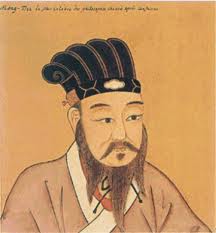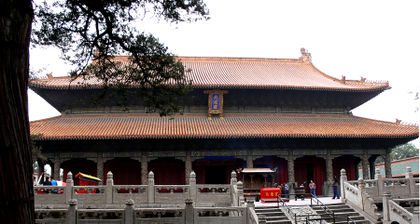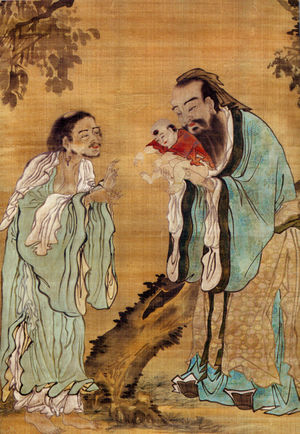Confucius/ru: Difference between revisions
PeterDuffy (talk | contribs) (Created page with "Потомки часто неверно понимали Конфуция и считали его скучным бюрократом, но Конфуций обладал...") |
PeterDuffy (talk | contribs) (Created page with "Конфуций родился в 551 году до нашей эры, когда в стране царили смятение и хаос. Его отец, пожилой...") |
||
| Line 16: | Line 16: | ||
== Confucius’ life == | == Confucius’ life == | ||
Конфуций родился в 551 году до нашей эры, когда в стране царили смятение и хаос. Его отец, пожилой воин из знатного княжеского рода, умер, когда сыну было три года. Несмотря на бедность семьи, Конфуций сумел получить образование. В возрасте пятнадцати лет он знал, что хочет быть ученым. Он работал писарем в мемориальном храме князя Чжоу, одного из величайших государственных деятелей в китайской истории. | |||
Five hundred years earlier, the Duke of Chou, his father, King Wen, and his brother had overthrown the corrupt Shang dynasty and established the Chou dynasty. He brought a new understanding of God and divine government to the Chinese people. “I am only concerned with Heaven and the people,”<ref>The Duke of Chou, quoted in Herrlee G. Greel, ''The Origins of Statecraft in China'' (Chicago: University of Chicago Press, 1970), 1:98.</ref> he had said. | Five hundred years earlier, the Duke of Chou, his father, King Wen, and his brother had overthrown the corrupt Shang dynasty and established the Chou dynasty. He brought a new understanding of God and divine government to the Chinese people. “I am only concerned with Heaven and the people,”<ref>The Duke of Chou, quoted in Herrlee G. Greel, ''The Origins of Statecraft in China'' (Chicago: University of Chicago Press, 1970), 1:98.</ref> he had said. | ||
Revision as of 14:09, 27 March 2022

Конфуций служит на Втором луче — луче божественной мудрости. 3 июля 1958 года он стал иерархом обители Ройял Тетон, сменив Господа Ланто на этом посту.
Confucius’ legacy
Многие воплощения он отдал служению свету, но больше всего Конфуция помнят за его вклад в китайский образ жизни. Известный своим современникам в 5 веке до н. э. как Кун-фу-цзы («Мудрец Кун» или «Учитель из рода Кун»), он подготовил почву для объединения китайской империи и формирования ее управленческого аппарата. Будучи блестящим философом в социальной, экономической, политической и нравственной сферах, Конфуций заложил теоретические принципы, позволившие Китаю стать одной из величайших цивилизаций всех времен. Династии расцветали и приходили к упадку, а конфуцианское государство продолжало существовать; и со временем китайская культура, идеи Конфуция распространились по всей Восточной Азии. Редко можно встретить человека, который оказывал бы влияние на такое большое количество людей в течение столь продолжительного времени.
Конфуция чтят как величайшего китайского учителя; ему поклоняются как великому бодхисаттве, или грядущему Будде. Он верил, что Небеса можно принести на Землю с помощью ритуала и музыки. Его последователи стали известны как Рыцари Искусства, так как овладели мастерством в стрельбе из лука, поэзии, математике, истории, танцах, религиозных ритуалах и этикете.
Потомки часто неверно понимали Конфуция и считали его скучным бюрократом, но Конфуций обладал глубокой духовностью и проницательным видением. Отсюда — его выдающаяся практичность. Конфуций учил: «С Пути нельзя уходить ни на мгновение; если бы с него можно было уйти, то это был бы не Путь».[1] Несмотря на попытку вытравить его учение, такие поговорки Конфуция, как «достойный человек спрашивает с себя, а ничтожный — с других»[2] и «осторожный редко ошибается»,[3] остаются неотъемлемой частью мышления китайского народа.

Confucius’ life
Конфуций родился в 551 году до нашей эры, когда в стране царили смятение и хаос. Его отец, пожилой воин из знатного княжеского рода, умер, когда сыну было три года. Несмотря на бедность семьи, Конфуций сумел получить образование. В возрасте пятнадцати лет он знал, что хочет быть ученым. Он работал писарем в мемориальном храме князя Чжоу, одного из величайших государственных деятелей в китайской истории.
Five hundred years earlier, the Duke of Chou, his father, King Wen, and his brother had overthrown the corrupt Shang dynasty and established the Chou dynasty. He brought a new understanding of God and divine government to the Chinese people. “I am only concerned with Heaven and the people,”[4] he had said.
Confucius believed that the Duke of Chou was teaching him in his dreams at night. In fact, Confucius claimed that he himself was not an innovator—he was only bringing back the standard and the principles of the Duke of Chou. (The Duke of Chou was an embodiment of Lord Lanto, and it is believed that Confucius was embodied at the time of the Duke of Chou and helped him implement his ideals.)

Inspired by the Duke of Chou, Confucius edited the six Chinese classics, which had been written by King Wen. These were the Book of Poetry, the Book of Rites, the Book of History, the Book of Change (I Ching), the Book of Documents and the Book of Music. The Book of Music, unfortunately, has been completely lost.
Today Confucius has a reputation for being stiff and reserved. But he was not without sensitivity. The story is told that he was once so moved by a performance of ancient music that he remained in a stupor for three months. When he finally came out of the trance, he said, “I never imagined that music could be so sublime.”[5]
We do not know much about Confucius’ life. He was married when he was nineteen and had a son and a daughter. He studied under various teachers and eventually gathered a group of students around him. For a time, he held a job as justice minister but was forced to abandon it and go into exile. Although Confucius had seventy-two disciples and more than three thousand students, he never realized his dream of becoming a prominent ruler in China.
During this time, the Chou dynasty was on the verge of collapse. The Chou government had degenerated into chaos, and brutal warlords continually fought with each other. “Confucius was the first to formulate a systematic response to this crisis in values,” writes Robert Eno, scholar of Chinese thought. “And the depth of his achievement is reflected by the fact that China’s first philosopher remained throughout its history its leading philosopher.”[6]
Confucius believed that ritual, or li, could transform one’s identity, one’s mind, one’s very being. “The program of study begins with the chanting of texts and ends with the study of ritual li,” Confucius explained. “Its significance is that one begins by becoming a gentleman and ends by becoming a Sage.”[7] Through disciplined cultivation of li, one attained jen, which Eno describes as “the selfless ethical responsiveness to others.”[8]
Although Confucius traveled throughout China, he never found a suitable job in the government. He felt like a failure and started to lament: “Extreme indeed is my decline. It’s been a long time since I dreamt about the Duke of Chou.”[9]
Confucius did not realize it at the time, but his spirituality was far more powerful than his resumé. He wandered about looking for work, but what he was really doing was anchoring his spiritual flame of wisdom in every corner of China. That flame inspired and sustained Chinese culture for many centuries.

His service today
As an ascended master, Confucius still dreams of making a heaven on earth through divine government. While he has not been able to work this dream in China, he sees himself as the grandfather of America. With practical wisdom and deep love, he inspires and guides his disciples who have embodied in the United States. Lanto explains that the practical side of the culture of America comes from the causal body of Confucius.
The ascended master Confucius has a profound understanding of family as the vital unit for building community and a new society in the Aquarian age. He shows us how to take etheric patterns and use them in tangible ways to improve our everyday lives—patterns of self-reliance in God, of the sacred family and of God-government. We tie into the etheric patterns and precipitate the etheric ideals through beauty, harmony and order in the physical octave. This is why the flame of precipitation is the main focus of Confucius’ Royal Teton Retreat. This flame is Chinese green in color, tinged with gold, and it burns on the main altar of the Retreat.
Confucius wants us to regard him as our loving and supportive grandfather. And like a grandfather, he also desires to pass on his dreams to us that we might fulfill them in his name. He longs to build a society on the foundation of love, wisdom and the will of God in the individual and in the family.
In 1976, Confucius said that many souls from ancient China have reembodied in America. He called them “the quiet Buddhic souls, the diligent ones,” the ones who have a spiritual mission to lay the foundation of the family in America. He points out that they understand the “basic loyalty of the family, the code of ethics, the gentleness, the sweetness and the desire for learning as the means to God-awareness.”
Furthermore, Confucius said, “They have come for an embodiment that their wisdom might be fired with freedom, that they might assist America” as she enters the twenty-first century. Their aim is to turn around a “false materialism” and to manifest instead “an etherealization, a spirituality, a conquering of self, of society and of the energies of time and space.”
Confucius is very much concerned with the affairs of civilization and with the destiny of America:
I am concerned on the one hand with the activities of the masculine ray as that ray has been perverted in China today and as its perversion has also led to the perversion of the feminine ray and the manifestation of the family.
I have seen the corruption in government. It is the same corruption that I witnessed twenty-five hundred years ago—the same corruption, mind you, the same corruptible ones. For the lifestreams who are focusing the energies for the disintegration of the light and of the golden age of China today are the lifestreams who thwarted the cosmic purpose of the Virgin thousands of years ago when my feet touched the earth and the streams of that beloved land of Chin.
I have noticed also that those who are the corruptible ones who have corrupted Saint Germain’s promise for America have come again and again. It is they who were the rats in the granary of Rome and Greece, India, the Middle East. There are always the betrayers.[10]
Confucius has said:
It is only cosmic justice that a balance should be made for the expenditure of every ounce of energy. Through the aeons and aeons of creation, this great law has never been violated with impunity. And those who think they can violate divine statutes have quickly found out upon the cosmic screen of life that the scales of divine justice do act, and that they act wisely and well.[11]
Sources
Марк Л. Профет и Элизабет Клэр Профет, Владыки и их Обители, «Конфуций.»
- ↑ Confucius, The Doctrine of the Mean, trans. James Legge.
- ↑ Confucius, Analects, 15:20, trans. Arthur Waley.
- ↑ Confucius, Analects, 4:23.
- ↑ The Duke of Chou, quoted in Herrlee G. Greel, The Origins of Statecraft in China (Chicago: University of Chicago Press, 1970), 1:98.
- ↑ Confucius, Analects, 7:13, trans. James Legge.
- ↑ Robert Eno, The Confucian Creation of Heaven: Philosophy and the Defense of Ritual Mastery (Albany: State University of New York Press, 1990), p. 2.
- ↑ Ibid., p. 3.
- ↑ Ibid., p. 5.
- ↑ Confucius, Analects, 7:5.
- ↑ Confucius, “The Golden Light of the Golden Age of China,” June 13, 1976.
- ↑ Confucius, July 3, 1962.
